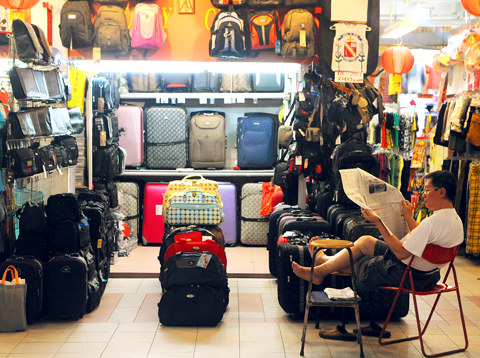Singapore’s economy, already in recession, shrank 4.2 percent in the fourth quarter of last year from a year earlier, with overall annual growth coming in at 1.1 percent, the government said yesterday.
The Ministry of Trade and Industry maintained its forecast for this year of a GDP shrinkage of 2 percent to 5 percent amid fears the contraction may worsen if the global situation deteriorates further.
“Singapore’s GDP growth prospects appear weak in 2009 on account of the pessimistic global economic outlook ... the Singapore economy will experience continued deterioration in the near term,” the ministry said.

PHOTO: AFP
The 1.1 percent figure for overall annual growth last year is lower than the government’s estimate of 1.2 percent and sharply contrasts with the revised 7.8 percent growth figure for 2007.
Last quarter’s economic contraction of 4.2 percent was worse than the preliminary estimate of a 3.7 percent decline released last month.
On a seasonally adjusted annualized quarter-on-quarter basis, GDP declined 16.4 percent in the fourth quarter, slightly better than the previous estimate of a fall of 16.9 percent, the ministry said in its economic survey.
“The economy is likely to continue to perform weakly in the first half of 2009,” the ministry said. “The spillover effects of the global crisis will have an impact on many sectors.”
During the fourth quarter of last year, the city-state’s key manufacturing sector declined 10.7 percent annually and 21.3 percent on a seasonally adjusted annualized quarterly basis. For all of last year, the manufacturing sector fell 4.1 percent compared with a 5.9 percent expansion in the previous year.
The sector is being hit especially hard by the steep drop in export demand from Singapore’s main markets including the US.
In particular, Singapore’s electronics industry has seen orders evaporate rapidly as consumers in the US and other major economies hold back on spending.
Pharmaceutical output has also fallen in Singapore, which in October became the first Asian economy to sink into a recession after two straight quarters of contraction.
“The manufacturing sector will likely be weighed down by declines in global demand for electronics products, pharmaceuticals and chemicals,” the ministry said.
Economists are anticipating a sharp slowdown in the first quarter.
DBS Bank said in a note after yesterday’s announcement that the outlook for the economy was “looking gloomier than ever, especially for the export-dependent manufacturing sector.”
Oversea-Chinese Banking Corp economists have cut Singapore’s outlook for this year to a contraction of 4.8 percent and are tipping an annual drop of 6.1 percent for the first quarter.
Singaporean Prime Minister Lee Hsien Loong (李顯龍) said earlier this week the economy could shrink by more than 5 percent this year if the global downturn worsened.

Rainfall is expected to become more widespread and persistent across central and southern Taiwan over the next few days, with the effects of the weather patterns becoming most prominent between last night and tomorrow, the Central Weather Administration (CWA) said yesterday. Independent meteorologist Daniel Wu (吳德榮) said that based on the latest forecast models of the combination of a low-pressure system and southwesterly winds, rainfall and flooding are expected to continue in central and southern Taiwan from today to Sunday. The CWA also warned of flash floods, thunder and lightning, and strong gusts in these areas, as well as landslides and fallen

WAITING GAME: The US has so far only offered a ‘best rate tariff,’ which officials assume is about 15 percent, the same as Japan, a person familiar with the matter said Taiwan and the US have completed “technical consultations” regarding tariffs and a finalized rate is expected to be released soon, Executive Yuan spokeswoman Michelle Lee (李慧芝) told a news conference yesterday, as a 90-day pause on US President Donald Trump’s “reciprocal” tariffs is set to expire today. The two countries have reached a “certain degree of consensus” on issues such as tariffs, nontariff trade barriers, trade facilitation, supply chain resilience and economic security, Lee said. They also discussed opportunities for cooperation, investment and procurement, she said. A joint statement is still being negotiated and would be released once the US government has made

SOUTH CHINA SEA? The Philippine president spoke of adding more classrooms and power plants, while skipping tensions with China over disputed areas Philippine President Ferdinand Marcos Jr yesterday blasted “useless and crumbling” flood control projects in a state of the nation address that focused on domestic issues after a months-long feud with his vice president. Addressing a joint session of congress after days of rain that left at least 31 dead, Marcos repeated his recent warning that the nation faced a climate change-driven “new normal,” while pledging to investigate publicly funded projects that had failed. “Let’s not pretend, the people know that these projects can breed corruption. Kickbacks ... for the boys,” he said, citing houses that were “swept away” by the floods. “Someone has

‘CRUDE’: The potential countermeasure is in response to South Africa renaming Taiwan’s representative offices and the insistence that it move out of Pretoria Taiwan is considering banning exports of semiconductors to South Africa after the latter unilaterally downgraded and changed the names of Taiwan’s two representative offices, the Ministry of Foreign Affairs (MOFA) said yesterday. On Monday last week, the South African Department of International Relations and Cooperation unilaterally released a statement saying that, as of April 1, the Taipei Liaison Offices in Pretoria and Cape Town had been renamed the “Taipei Commercial Office in Johannesburg” and the “Taipei Commercial Office in Cape Town.” Citing UN General Assembly Resolution 2758, it said that South Africa “recognizes the People’s Republic of China (PRC) as the sole